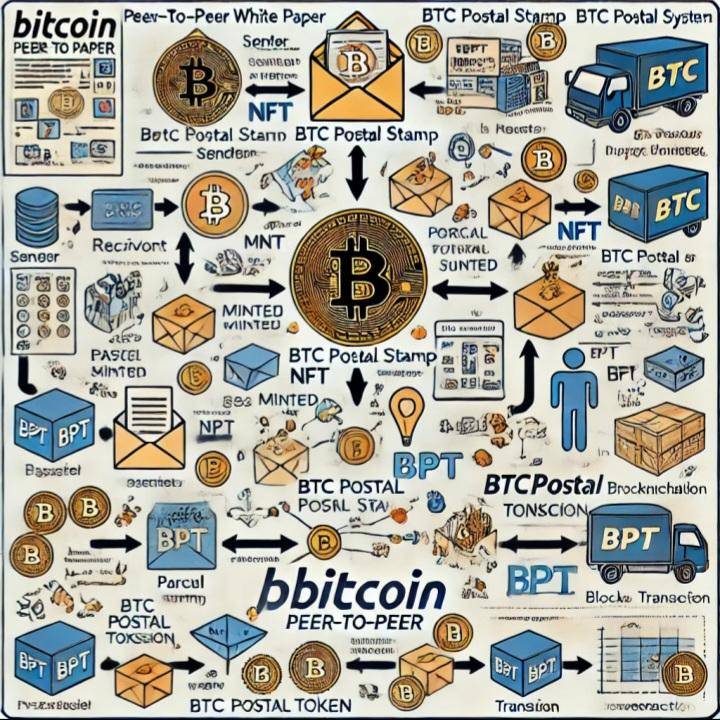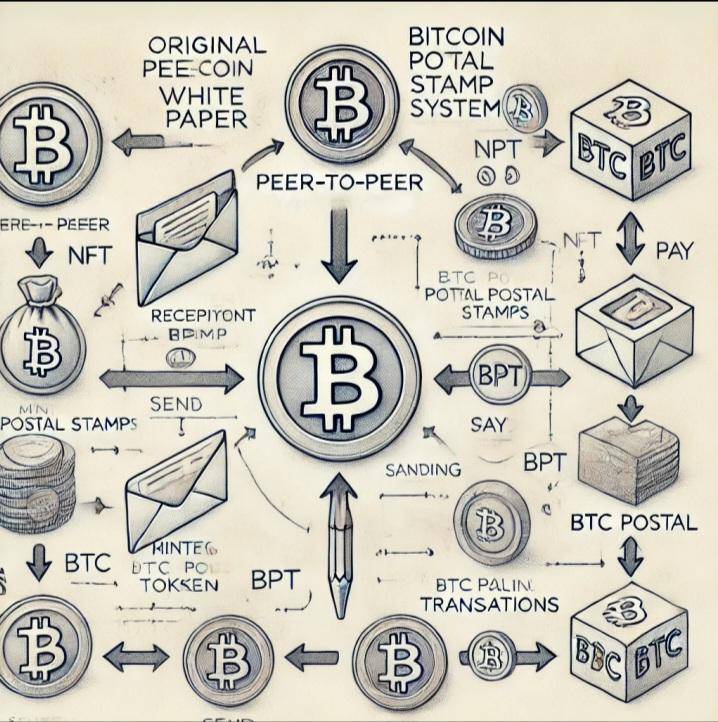White Paper: Peer-to-Peer Bitcoin Postal Stamps
Thu,30 Jan 2025 08:22:00- Font Size
- Share Content





White Paper: Peer-to-Peer Bitcoin Postal Stamps
A Decentralized Time-Based Blockchain System for Postal Transactions
Abstract
The Bitcoin Postal Stamp service introduces a decentralized platform that combines the principles of blockchain technology with the concept of time-based transactions. By leveraging the immutable and transparent nature of Bitcoin, the system allows users to issue, verify, and exchange Bitcoin Postal Stamps (BPS). Each BPS is validated and recorded on the blockchain, acting as a virtual representation of a time-based postal transaction. This white paper presents the Bitcoin Postal Stamp Services, which include time-block mining, digital twins of stamps, and peer-to-peer (P2P) capabilities for secure, transparent, and efficient delivery.
Introduction
The world of blockchain and cryptocurrency has witnessed rapid advancements in recent years, with Bitcoin leading the charge in decentralized finance. However, the blockchain space has yet to fully integrate time-based and transaction-based services in a meaningful way. The Bitcoin Postal Stamp system, developed by Time Chain Technology, combines Time Blockchain Technology (TBT) with Bitcoin’s security to provide an innovative solution for postal transactions.
Postal stamps traditionally represent a proof of postage for a given transaction, but through blockchain, these stamps now become not just proof of postage but a secure, verified, time-stamped record of events within the blockchain.
The Vision
Our vision is to provide a decentralized solution for the postal system, where time-stamps and postal stamps can be securely exchanged, tracked, and validated on the Bitcoin blockchain. By creating Bitcoin Postal Stamps (BPS), the system facilitates transparent and irreversible transactions that benefit both individuals and businesses by providing a peer-to-peer (P2P) network.
The Blockchain System
The Bitcoin Postal Stamp service is a decentralized application (dApp) that runs on the Bitcoin blockchain, using its security and immutability to store timestamped transactions as Bitcoin Postal Stamps. The system uses Time Block Mining to validate each transaction by associating a unique time block with each postal transaction.
Time Block Mining
Time-based Mining
Instead of traditional computational mining, Time Block Mining requires users to commit time to generate a Time Block (mined as a Bitcoin Postal Stamp).
Proof of Time
Similar to Proof of Work (PoW) in Bitcoin, Proof of Time involves validating transactions with time commitment. The longer the time committed, the more validated the transaction becomes.
Postal Stamps
Each Time Block mined results in a digital Postal Stamp that can be sent or exchanged between parties.
Digital Twin: Representation and Validation
A digital twin is created for every Bitcoin Postal Stamp (BPS), reflecting the unique data associated with the transaction. The digital twin serves as the virtual counterpart of the postal stamp, reflecting key data such as:
- Transaction ID
- Time Block Duration
- User Info
- Timestamp
- Status of Transaction (Sent, Delivered, Validated)
This digital twin allows for a mirrored and real-time validation system. Every Bitcoin Postal Stamp has a corresponding digital twin for verification and tracking, providing users with a clear and accessible representation of their stamped transactions.
How Bitcoin Postal Stamps Work
1. Generation of Bitcoin Postal Stamps (BPS):
Users begin the process by committing time for mining a Time Block. This process generates a Postal Stamp corresponding to the time committed.
2. Peer-to-Peer Transactions:
The generated Bitcoin Postal Stamp can then be exchanged peer-to-peer (P2P) between users. This peer exchange allows for decentralized, fee-less transactions.
3. Tracking and Validation:
Each Bitcoin Postal Stamp is recorded on the blockchain with the time block. The digital twin for the stamp provides a secure way to track the status of the stamp at every point of the transaction.
4. Final Confirmation:
Once the transaction is completed, a final confirmation of the transaction (an Amen sign-off) is recorded, marking the event as completed and verified in the blockchain.
Blockchain Timestamp
Each Bitcoin Postal Stamp is recorded with an immutable timestamp on the Bitcoin blockchain, ensuring that the transaction is securely validated and verified at the moment of creation. The timestamp is a unique digital fingerprint that reflects the time of the transaction, making the data tamper-resistant and verifiable at any point in the future. This process ensures that the entire Bitcoin Postal Stamp system is decentralized and transparent.
Timestamp Example:
Transaction ID: BPS-123456789
Timestamp: 2025-01-30T14:55:00Z
Blockchain Transaction Confirmation: Click here to verify
This timestamp ensures that the Bitcoin Postal Stamp is unique, traceable, and verified without the possibility of manipulation or alteration. It is recorded on the Bitcoin blockchain, allowing participants to confirm the authenticity and timing of the transaction at any point.
Security and Transparency
The security of Bitcoin ensures that Bitcoin Postal Stamps are immutable, transparent, and tamper-proof. The system is built on the following principles:
- Immutability: All Bitcoin Postal Stamps are recorded on the Bitcoin blockchain, ensuring that the transaction details cannot be altered or tampered with.
- Transparency: Each postal stamp is visible to all participants on the network, and the transaction history is publicly available for verification.
- Decentralization: The system operates in a decentralized manner, removing the need for intermediaries and reducing the risks of centralized control.
Bitcoin Postal Stamp Ecosystem
The Bitcoin Postal Stamp ecosystem is composed of three main components:
- Users: Individuals and businesses that create, send, and receive Bitcoin Postal Stamps.
- Miners: Those who commit their time to mining Time Blocks and generating Bitcoin Postal Stamps.
- Validators: Network participants who verify transactions and ensure the validity of each Bitcoin Postal Stamp and its digital twin.
Use Cases
- Digital Postal Services: A fully decentralized postal system powered by Bitcoin, allowing users to send timestamped packages and letters securely and globally.
- Supply Chain Tracking: Bitcoin Postal Stamps can be used to track shipments and deliveries across the supply chain, providing a verified record of every item’s movement.
- Time-based Authentication: Businesses can use Bitcoin Postal Stamps for authentication purposes, validating the time of transactions, agreements, and signatures.
Conclusion
The Bitcoin Postal Stamp system introduces an innovative way to leverage blockchain for postal transactions, integrating Time Block Mining with Bitcoin's security and digital twin technology. It provides an immutable, transparent, and decentralized solution for timestamping and exchanging transactions between peers. With the added benefit of being able to track and validate each transaction via digital twins, the system offers enhanced security, efficiency, and accountability in postal services.
By enabling peer-to-peer (P2P) exchange of Bitcoin Postal Stamps, this service opens the door to new applications and innovations in digital postal services, supply chain management, and time-based transaction tracking.
Call to Action
We invite developers, miners, businesses, and users to join the Bitcoin Postal Stamp ecosystem. Together, we can create a decentralized, secure, and time-based postal system that benefits everyone by reducing costs, improving transparency, and ensuring the integrity of every transaction.